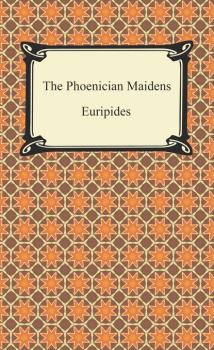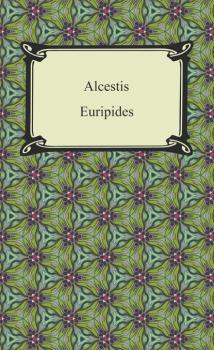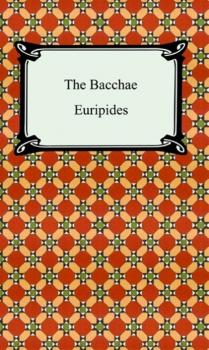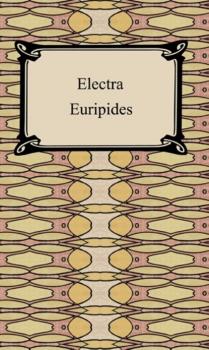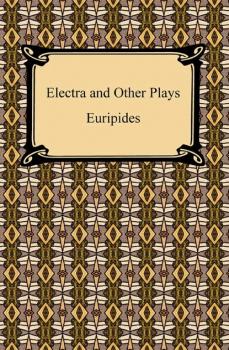ТОП просматриваемых книг сайта:
Euripides
Список книг автора EuripidesАннотация
Euripides (480 BC-406 BC) is revered as one of the three great tragedians of classical Athens, along with Aeschylus and Sophocles, and produced the largest body of extant work by any ancient playwright. He is considered to be the most modern of the three, and his works laid the foundation for Western theatre. His writing sticks out from that of his contemporaries because of his colloquial vocabulary, meter and syntax, distinct from the grandiose language of his predecessors. In writing «Orestes» (408 b.c.e.), Euripides utilized the mythology of the Bronze Age to reflect upon the politics of Athens during the Peloponnesian War. The story takes places after Orestes has murdered his mother to avenge his father, Agamemnon, and follows him as he attempts to save his own life. The play explores themes of man's subordination to the gods and the conflict between natural law and man-made law.
Аннотация
Euripides turned to playwriting at a young age, achieving his first victory in the dramatic competitions of the Athenian City Dionysia in 441 b.c.e. He would be awarded this honor three more times in his life, and once more posthumously. His plays are often ironic, pessimistic, and display radical rejection of classical decorum and rules. Together with Aeschylus and Sophocles, Euripides would provide the canon of Greek tragedy and thereby lay the foundation of Western theatre. «The Phoenician Maidens» was written between 411 and 409 b.c.e., and is named for the play's Chorus, which is composed of Phoenician women who are accidentally trapped in Thebes by war. The play was very popular in the later Greek schools for its action and graphic descriptions. It tells the story of Polynices and Eteocles, the sons of Oedipus, and their fight for the crown of Thebes.
Аннотация
Euripides, along was Sophocles and Aeschylus, is responsible for the great rise of Greek tragedy. It was in the 5th Century BC, during the height of Greece's cultural bloom, that Euripides lived and worked. Of his roughly ninety-two plays, only seventeen tragedies survive. Both ridiculed and lauded during his life, Euripides now stands as an innovator of the Greek drama. His play «Alcestis» was awarded second place upon its debut in 438 at the Festival Dionysia, the litmus test and judging grounds for Greek tragedy of the day. «Alcestis», the oldest of his extant plays, examines love, death, and marriage. The play follows Apollo, Admetus, and Heracles as they struggle to save Admetus' beloved wife Princess Alcestis from thanatos (death) in Hades. The play is now considered a problem play due to its difficult categorization between tragedy and comedy. «Alcestis» continues to stir debate and discussion and remains one of Euripides most fascinating works.
Аннотация
Euripides (480 BC-406 BC) is revered as one of the three great tragedians of classical Athens, along with Aeschylus and Sophocles, and produced the largest body of extant work by any ancient playwright. These three provided the canon of Greek tragedy and thereby lay the foundation of Western theatre. Euripides' works are characterized by their moral ambiguity, plots of intrigue, and a separate character (usually a deity) who introduces the play with an explanatory prologue. «Heracles» was first performed in 416 b.c.e. at the City Dionysia festival, and remains one of the playwright's most puzzling works. The somewhat disconnected halves of this story feature a powerful climax when Heracles undergoes a fit of madness in the underworld. It explores themes of courage, endurance and nobility, as Heracles comes to the realization that he must accept his flaws and face whatever life has in store for him.
Аннотация
Euripides, the youngest of the trio of great Greek tragedians was born at Salamis in 480 B.C., on the day when the Greeks won their momentous naval victory there over the fleet of the Persians. The precise social status of his parents is not clear but he received a good education, was early distinguished as an athlete, and showed talent in painting and oratory. He was a fellow student of Pericles, and his dramas show the influence of the philosophical ideas of Anaxagoras and of Socrates, with whom he was personally intimate. Like Socrates, he was accused of impiety, and this, along with domestic infelicity, has been supposed to afford a motive for his withdrawal from Athens, first to Magnesia and later to the court of Archelaues in Macedonia where he died in 406 B.C.
Euripides's «The Bacchae» is considered by many to be one of his greatest surviving works. It is the story of Dionysus's arrival in Greece and his attempt to influence the people there to worship him.
Euripides's «The Bacchae» is considered by many to be one of his greatest surviving works. It is the story of Dionysus's arrival in Greece and his attempt to influence the people there to worship him.
Аннотация
Though little is known for certain of his early life, Euripides was probably born around 460 b.c.e. to the farmer Mnesarchus and his wife Clito, and his studious nature quickly led him to a literary life in Athens. Eighteen of Euripides' ninety-two works remain today, making his the largest extant collection of work by an ancient playwright. His work sticks out from that of his contemporaries because of his colloquial vocabulary, meter and syntax, distinct from the grandiose language of his predecessors. The Heracleidae in Greek mythology are the descendants of Heracles, who claimed a right to rule because of their ancestor. The Greek tragedians drew inspiration from local legends, which served to glorify the services rendered by Athens to the rulers of Peloponnesus. Euripides' play, «The Heracleidae», follows the children of Heracles and their protectors as they seek the aid of Demophon and the city of Athens against the vengeance of Eurystheus of Argos.
Аннотация
Together with Aeschylus and Sophocles, Euripides provided the canon of Greek tragedy and thereby laid the foundation of Western theatre. Though little is known for certain of his early life, Euripides was probably born around 460 b.c.e. to the farmer Mnesarchus and his wife Clito, and his studious nature quickly led him to a literary life in Athens. His plays are often ironic, pessimistic, and display radical rejection of classical decorum and rules. «Hippolytus» was first produced for the City Dionysia of Athens in 428 b.c.e. and won first prize. It is a religious and psychological retelling of the mythological rivalry between Aphrodite, the goddess of love, and Artemis, the goddess of chastity. The gods play an important role in the story of three main characters – Phaedra, Hippolytus, and Theseus – and help to unveil themes of carnal vs. spiritual love, and passion vs. restraint.
Аннотация
"The Electra of Euripides has the distinction of being, perhaps, the best abused, and, one might add, not the best understood, of ancient tragedies. «A singular monument of poetical, or rather unpoetical perversity;» «the very worst of all his pieces;» are, for instance, the phrases applied to it by Schlegel. Considering that he judged it by the standards of conventional classicism, he could scarcely have arrived at any different conclusion. For it is essentially, and perhaps consciously, a protest against those standards. So, indeed, is the tragedy of The Trojan Women; but on very different lines. The Electra has none of the imaginative splendour, the vastness, the intense poetry, of that wonderful work. It is a close-knit, powerful, well-constructed play, as realistic as the tragic conventions will allow, intellectual and rebellious. Its psychology reminds one of Browning, or even of Ibsen." So begins the introduction to the «Electra» as translated and introduced by Gilbert Murray.
Аннотация
In «Electra and Other Plays» we have a collection of five of the classical dramatist Euripides' best plays. In the title work «Electra», before the events of this play, the Greek general Agamemnon sacrificed a daughter to appease the gods and gain permission to sail for Troy. His wife Clytemnestra never forgave him, and upon his return she and her lover murder him. Euripides picks up the story with the children of Agamemnon and Clytemnestra, the young Electra, who has been sent to live on a farm, and her brother Orestes, who was sent to grow up abroad. Though they are more or less exiled to quench their desire to avenge their father's death, both are still quite determined to do so. Electra is fixated by dreams of revenge, and she eagerly awaits the return of Orestes, who will aid her in vengeance. Also included in this work are the following additional plays: «Andromache», «Hecuba», «The Suppliants», and «The Trojan Women».
Аннотация
Euripides (480 BC-406 BC) is revered as one of the three great tragedians of classical Athens, along with Aeschylus and Sophocles, and produced the largest body of extant work by any ancient playwright. He is considered to be the most modern of the three, and he laid the foundation for Western theatre. His works are characterized by their moral ambiguity, plots of intrigue, and a separate character (usually a deity) who introduces the play with an explanatory prologue. «The Cyclops» dramatizes one of the most recognizable episodes from Homer's «Odyssey». It is not one of Euripides' most famous works, however, it is the only complete preserved satyr play from ancient Greece. A satyr was a light and humorous play that was usually produced after a series of three tragedies in order to relieve Greek audiences from the seriousness and gloom of those previous. It typically parodied the previous plays' tragic characters and themes.


